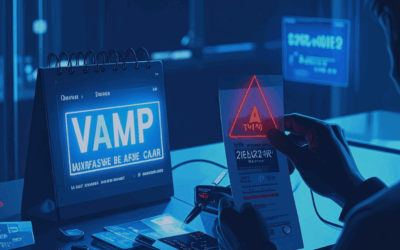Chargebacks are now a major problem for both merchants and payment stakeholders who operate in the ever evolving landscape of digital commerce. The likelihood of disputed payments, which frequently results in costly chargebacks, rising rapidly in line with the constant increase in online transactions. In addition to reducing profit margins, these chargebacks put a strain on company resources, as handling and resolving them can take a lot of time and labor. However, in this day and age, businesses are looking for Chargeback Automation Solutions to reduce the relliance on on manual processes and interventions for fighting and stopping chargebacks.
Many merchants use Chargeback Alerts as an early warning method to prevent this. Important notifications are provided via Alerts such as Ethoca Alerts and Verifi CDRN (Cardholder Dispute Resolution Network), which allow businesses to take swift action on any incoming disputes before they turn into full chargebacks. In order to lessen the financial and operational impact of chargebacks, these Alerts enable businesses to proactively handle disputes, whether by contacting customers to resolve the issue or issuing refunds. However, with Chargeback volumes increasing, these Alerts can also overload teams when managed manually, which can lead to missed alerts, delays, and possibly higher chargeback ratios. Ultimately, this can affect relationships with payment processors and acquiring banks.
Merchants must find a way to effectively handle these Alerts, on an automated level, in order to achieve their full potential. PayShield’s Dispute Intelligence and Verifi RDR (Rapid Dispute Resolution) Alerts offer advanced solutions tailored for this purpose. By establishing custom rules to handle Alerts carefully, Dispute Intelligence streamlines the workflow and allows merchants to automate the response process for Verifi CDRN and Ethoca Alerts. Verifi RDR also offers automatic refunds based on pre-set rules for businesses who prefer a completely automated solution, guaranteeing that disputes are settled swiftly and minimising the need for human involvement.
Understanding Chargeback Alerts: Verifi CDRN and Ethoca Alerts
Verifi CDRN Alerts
Verifi CDRN gives merchants early notice of any disputes inside the Visa network, which includes more than 1,000 financial institutions, especially in the United States. When a cardholder files a dispute, the system alerts merchants, providing them with a brief window of opportunity to resolve the matter before it becomes a chargeback. Verifi CDRN requires merchants to review and resolve each alert, in contrast to Verifi’s other solution (Verifi RDR). This gives them the opportunity to decide on the best course of action for each disagreement. Because of this capability, Verifi is especially well-suited for merchants in the US market who deal with a large number of chargebacks that are not related to fraud.
Ethoca Alerts
With a wider network coverage that includes more than 5,000 financial institutions, including Mastercard and other significant banks in Europe, Asia, and Canada, Ethoca Alerts functions similarly by offering early dispute notifications. Ethoca requires that merchants issue refunds and update their portal with the outcome of disputes. Ethoca Alerts is especially useful for handling fraud-related issues across a global customer base, due to its wider coverage network.
Automating Chargeback Alerts with PayShield’s Dispute Intelligence
Overview of PayShield’s Dispute Intelligence
PayShield’s Auto Resolution suite includes Dispute Intelligence, which is intended to streamline and automate Chargeback Alert management. This innovative solution offers proactive control over the handling of Chargeback Alerts by easily integrating with merchant systems. Dispute Intelligence, which is compatible with both Verifi CDRN and Ethoca Alerts, enables merchants to automate the processing of incoming alerts, which lowers fees, reduces manual labor, and increases the effectiveness of dispute resolution. Dispute Intelligence may be relied upon by merchants to streamline processes, cut chargeback ratios, and lower fulfillment costs.
Automating Alerts
By using a structured, three-step method, Dispute Intelligence streamlines the alert management process, giving merchants more control and efficiency over incoming alerts.
Step 1: Dispute Initiation
When a consumer files a dispute, Dispute Intelligence is triggered as soon as a compatible Chargeback Alert is received. The system determines how each Alert should be handled by referencing a customized rule set that the merchant has configured.
Step 2: Automated Processing
Dispute Intelligence starts automated processing in accordance with the merchant’s pre-established rules after evaluating the Alert. Depending on the merchant’s requirements, the system can handle chargebacks in a customized way by performing whole or partial refunds or flagging alerts for manual review.
Step 3: Dispute Resolution
To prevent a chargeback, the issuing bank is informed of the dispute’s settlement, whether it be a refund or another course of action. There are fewer delays and a higher likelihood of a successful settlement because the entire process is streamlined.
Benefits of Automation
Using Dispute Intelligence to automate Chargeback Alerts has several advantages that help businesses protect profits and optimize processes:
Customizable Automation
To handle Chargeback Alerts, merchants can design custom rules that allow for fully or partially automated processing that suits their particular business requirements.
Reduced Fees and Costs
Dispute Intelligence ensures more efficient operations and less financial impact by reducing chargeback fees and fulfillment costs through early dispute resolution.
Accelerated Response Time
Workflows that are automated guarantee rapid reactions to Alerts, increasing the possibility that disputes will be settled before they become chargebacks.
Improved Operational Efficiency
Dispute Intelligence allows merchants to reallocate resources to other areas, increasing overall productivity, by automating repetitive procedures and reducing manual interaction.
By using a simplified, automated dispute resolution process, PayShield’s Dispute Intelligence helps merchants better handle Chargeback Alerts, reducing their chargeback ratios and protecting revenue.
The Power of Verifi RDR for Fully Automated Resolution
Introduction to Verifi RDR
Verifi RDR (Rapid Dispute Resolution) is a powerful Chargeback Alert for merchants seeking a fully automated approach to dispute resolution. As part of Visa’s chargeback management suite, Verifi RDR Alerts provides a seamless way for merchants to handle disputes before they escalate into full chargebacks. By applying pre-set rules, Verifi RDR ensures that disputes are resolved quickly and efficiently under one-umbrella, aligning with each merchant’s specific chargeback strategy. This solution allows merchants to respond to disputes automatically, eliminating the need for manual intervention.
How Verifi RDR Works
By giving merchants the ability to establish precise rules that specify how incoming Alerts are handled, Verifi RDR enables them to adopt a proactive stance. Without requiring manual inspection, merchants can set up these rules to automate specific processes, such as providing refunds for eligible disputes. Verifi RDR automatically examines the merchant’s rule set and handles the transaction in accordance with the specified criteria as soon as an Alert is received. This level of customization guarantees that every dispute is resolved in a manner that complements the merchant’s risk tolerance and business objectives.
Benefits of Using Verifi RDR
Time Savings
Verifi RDR frees up resources and lessens operational workload by removing the need for any manual review, enabling merchants to settle disputes with little effort.
Reduced Chargeback Rates
Automated dispute resolution reduces chargeback ratios and safeguards against risk by preventing alerts from turning into chargebacks.
Enhanced Merchant Reputation
Maintaining a good relationship with banks and processors through fast dispute resolution can result in better terms and reduced transaction costs.
Merchants can benefit from a fully automated, rule-based solution with Verifi RDR that effectively settles disputes, safeguards income, and encourages a proactive chargeback avoidance approach. Businesses can retain more efficient operations and better control over their dispute resolution procedures by streamlining conflict handling using Verifi RDR.
Choosing the Right Automation Solution: Dispute Intelligence vs. Verifi RDR
Comparison of Dispute Intelligence and Verifi RDR
Understanding the unique advantages of each option and how they fit with a merchant’s requirements for control, efficiency, and transaction coverage is essential to choosing the best chargeback automation solution.
Dispute Intelligence
Merchants can manage chargeback alerts with a great degree of customization and control thanks to Dispute Intelligence. Dispute Intelligence enables merchants to automate Alert responses according to their own specifications by supporting both Verifi CDRN and Ethoca Alerts. In order to provide flexibility for both Visa and Mastercard transactions, merchants can create custom rule sets that specify which alerts are handled automatically and which need to be reviewed manually. Dispute Intelligence gives merchants the ability to proactively handle disputes, access real-time statistics, and continuously improve their strategy based on transaction data by connecting easily with their current systems.
Verifi RDR
Verifi RDR is intended for businesses who value ease of use and speed. By automatically refunding transactions that satisfy predetermined rules, it streamlines the dispute resolution process and eliminates the need for human involvement. Merchants who deal with a lot of disputes and appreciate speedy, rule-based decisions may find this solution especially useful. But since Verifi RDR is mainly concerned with Visa transactions, it might not be as appropriate for businesses who deal with a lot of Mastercard transactions or have a wide foreign customer base.
Which Solution is the Best Fit?
When to Choose Dispute Intelligence
Dispute Intelligence will be especially helpful to merchants who need adaptable, adjustable control over dispute resolution. This solution is ideal for companies who require both automated and manual alert processing in addition to comprehensive information to improve their tactics. For merchants looking for extensive coverage across global markets, Dispute Intelligence is particularly beneficial due to its support for both Visa and Mastercard transactions.
When to Use Verifi RDR
Verifi RDR is the best option for merchants looking for a hands-off dispute resolution process. It offers an all-in-one solution, automated dispute settlement and works well for high-risk industries or merchants who value quick and effective processing and frequently face disputes. However, due to its Visa-mainly focus, Verifi RDR is most effective for merchants that mostly process VISA transactions, especially in regions where Visa transactions dominate.
When to Choose Both Dispute Intelligence and Verifi RDR
For businesses handling a variety of customers and complex dispute situations, selecting both Verifi RDR and Dispute Intelligence is the best option. With Verifi RDR, this combination approach delivers smooth automation for simple disputes, while Dispute Intelligence allows for additional manual monitoring and detailed management where necessary. Using both solutions guarantees thorough coverage of Visa and Mastercard transactions, lowers chargeback risks, and boosts overall efficiency for companies operating in international marketplaces.
Merchants can choose between either or both Verifi RDR’s automation and Dispute Intelligence’s flexibility based on a thorough analysis of their unique requirements, transaction patterns, and geographic focus. In terms of lowering chargebacks, safeguarding income, and automating dispute resolution processes, both options have clear benefits.
Implementing the Right Solution with PayShield
Choosing the appropriate solution and putting it into use precisely are essential for making the most of automation solutions. PayShield can guarantee a smooth connection tailored to particular business requirements, regardless of whether merchants choose the streamlined automation of Verifi RDR or the configurable capabilities of Dispute Intelligence.
Steps to Implementing Chargeback Automation with PayShield
Step 1: Assess Your Current Chargeback Management System
Start by assessing your current chargeback procedure to see what automation is required. Recognize the volume of transactions you make, the typical causes of disputes, and the places where manual intervention is using up resources. This will help you decide between Verifi RDR for speedy, automated remedies and Dispute Intelligence for all-encompassing control.
Step 2: Configure Automation Rules
Merchants can create automation rules in Verifi RDR or Dispute Intelligence with PayShield’s help. Both Verifi CDRN and Ethoca Alerts can be handled with flexibility by Dispute Intelligence, enabling merchants to design unique procedures for each kind of Alert. Setting up automated refund criteria for particular transaction types helps merchants who utilize Verifi RDR ensure quick, less-intervention dispute resolutions.
Step 3: Ongoing Optimization and Monitoring
Automation settings must be regularly monitored and adjusted for optimal efficiency. With the help of PayShield’s Dispute Intelligence, merchants can monitor performance indicators and make data-driven modifications in real time. This flexible strategy aids merchants in maintaining their flexibility and enhancing chargeback processing over time.
Contact PayShield for Tailored Implementation
Contact PayShield today to help in setting up and refining Verifi RDR and Dispute Intelligence systems if you are ready to embrace automation in your business! To find out how we can customize these solutions to meet your unique chargeback management requirements and help you improve automation, protect income, and accelerate procedures, get in touch with PayShield now.









